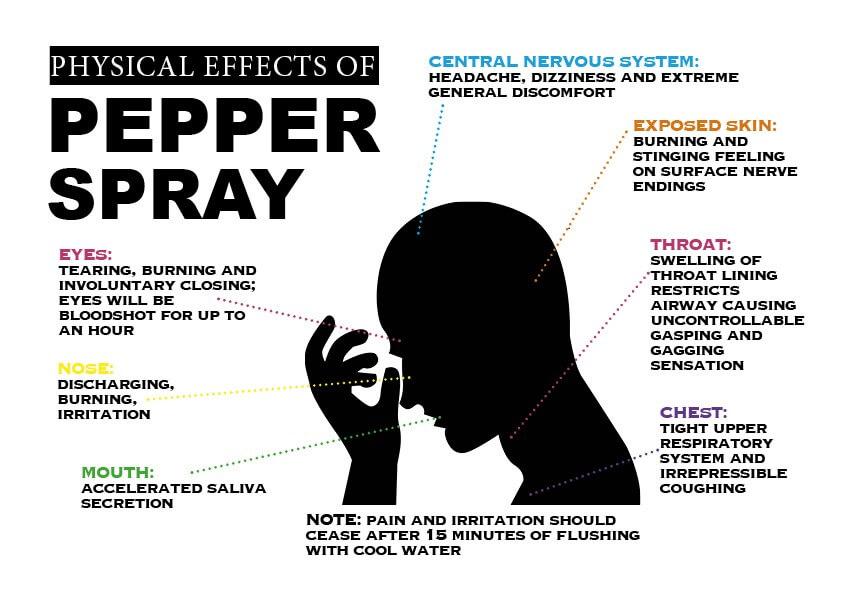Table of Contents
- Countries with Strictest Legal Restrictions on Pepper Spray Ownership
- Understanding Penalties and Legal Consequences for Unauthorized Use
- Comparative Analysis of Law Enforcement Approaches to Pepper Spray Violations
- Practical Advice for Travelers on Navigating Pepper Spray Laws Abroad
- The Conclusion
Countries with Strictest Legal Restrictions on Pepper Spray Ownership
When it comes to pepper spray, some nations adopt an exceptionally hardline approach, imposing severe legal consequences for unauthorized possession or use. In countries like Singapore, for instance, pepper spray is classified under stringent weapon laws, making ownership without explicit permission a criminal offense that can lead to hefty fines and even imprisonment. Similarly, in Japan, importing or carrying pepper spray without a special permit is heavily restricted, reflecting the country’s broader philosophy of strict weapon control. These regulations stem from concerns around public safety and misuse, and they serve as a strong deterrent against carrying such self-defense tools.
Other countries, including South Korea and United Arab Emirates, have laws that not only restrict ownership but also dictate the type and concentration of pepper spray that can be legally used. Violations can trigger severe penalties, such as criminal charges, long-term imprisonment, and even deportation for foreign nationals. In these regions, pepper spray is often regarded more as a controlled weapon than a defensive tool, with authorities demanding rigorous licensing processes or outright bans. The underlying message is clear: the legal landscape surrounding pepper spray in these countries is unforgiving, making it crucial for travelers and residents alike to fully understand and comply with local regulations.
Understanding Penalties and Legal Consequences for Unauthorized Use
Unauthorized possession or use of pepper spray carries serious penalties in many parts of the world, reflecting the potential danger it poses when misused. In some countries, legal systems impose severe fines that can reach thousands of dollars, while others enforce lengthy prison sentences to deter misuse. Moreover, violators may face additional consequences such as criminal records that severely impact travel, employment opportunities, and personal reputation. The exact nature of these penalties often depends on the context of use – whether for self-defense, illegal assault, or possession without appropriate permits.
It’s important to recognize that some countries maintain strict control over pepper spray by categorizing it as a prohibited weapon under their legal codes. When caught, offenders may be subject to:
- Confiscation of the spray and related paraphernalia
- Mandatory court appearances and potential criminal prosecution
- Restrictions on future purchase or possession
- Heavy fines combined with community service orders or probation
Comparative Analysis of Law Enforcement Approaches to Pepper Spray Violations
Globally, the legal response to unauthorized use or possession of pepper spray varies significantly, reflecting differing societal attitudes toward public safety and self-defense. In countries like Japan and Singapore, the enforcement is exceptionally stringent, with severe penalties including heavy fines and imprisonment for even minor violations. Law enforcement agencies in these nations prioritize strict control over weapon-like substances, often classifying pepper spray alongside other prohibited weapons. Conversely, jurisdictions such as the United States and Canada tend to adopt a more nuanced approach, distinguishing between lawful self-defense use and malicious intent. Here, penalties may range from warnings to misdemeanor charges, depending on the severity and context of the offense.
- Strict zero-tolerance enforcement: Countries enforcing absolute restrictions often involve mandatory confiscation and criminal prosecution.
- Context-based evaluations: Some law enforcement agencies assess incidents based on intent, resulting in lighter penalties for legitimate self-defense claims.
- Variability in legal definitions: Differences in how pepper spray is classified-whether as a weapon or a deterrent-impact enforcement strategies and judicial outcomes.
Practical Advice for Travelers on Navigating Pepper Spray Laws Abroad
Travelers must prioritize understanding the specific regulations governing pepper spray in each destination. While carrying pepper spray might seem like a sensible self-defense option, numerous countries impose strict bans or regulations on its possession, use, and transportation. For example, some European nations classify pepper spray as a controlled weapon, carrying penalties ranging from steep fines to imprisonment. Before packing your bag, always check current legal frameworks through official government websites or trusted travel advisory sources to avoid unintended violations. Remember, ignorance is rarely accepted as a defense in legal matters abroad.
When planning to bring pepper spray, consider the following precautions to help ensure compliance with local laws:
- Declare pepper spray at customs: In countries where allowed, declare it upfront to avoid suspicion or confiscation.
- Use travel locks or sealed containers: Some nations require pepper spray to be securely sealed and not readily accessible during flights or in public.
- Stay informed of regional variations: Laws may differ not only country-wide but also at regional or city levels, affecting where and when you may carry pepper spray.
- Respect law enforcement instructions: If questioned, cooperate fully and understand local procedures to mitigate enforcement actions.
Adhering to these practical steps greatly reduces the risk of legal trouble and empowers you to stay safe responsibly while traveling internationally.
The Conclusion
In summary, pepper spray regulations vary significantly across the globe, with some countries imposing strict penalties that reflect their cautious stance on self-defense tools. Understanding these legal landscapes is crucial for travelers, residents, and anyone considering pepper spray as a means of protection. Always stay informed about local laws to avoid unintended legal consequences and to ensure your safety measures remain both effective and lawful. Stay aware, stay protected, and respect the regulations wherever you are.Check Our Other Blogs
- StunGun – Your Trusted Source for Stun Guns, Laws, and Self-Defense Tips
- PepperSprayLaws – Your Trusted Resource for Pepper Spray Information
- StunGunLaws – Your Trusted Guide to Stun Gun Legality and Safety




